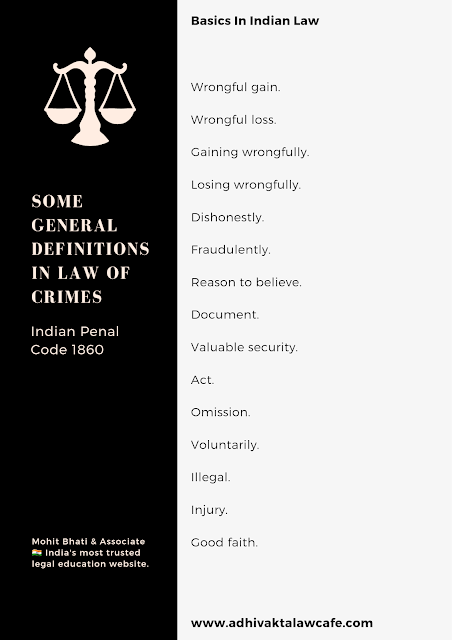Law provides for definitions of certain words that are used repeatedly in the Penal Code. The purpose is to give them a definite meaning and avoid repetition. We shall have a look at some of the most important terms of the Indian Penal Code.
Wrongful gain.
-
Gain of property
-
By unlawful means
-
To which the person gaining is not legally entitled.
Wrongful loss.
-
Loss of property
-
By unlawful means
-
To which the person losing it is legally entitled.
Gaining wrongfully.
A person is said to gain wrongfully when such person retains wrongfully, as well as when such person acquires wrongfully.
Losing wrongfully.
A person is said to lose wrongfully when such person is wrongfully kept out of any property, as well as when such person is wrongfully deprived of property.
Dishonestly.
Whoever does anything with the intention of causing wrongful gain to one person or wrongful loss to another person, is said to do that thing “dishonestly”.
Fraudulently.
A person is said to do a thing fraudulently if he does that thing with intent to defraud but not otherwise.
Reason to believe.
A person is said to have “reason to believe” a thing, if he has sufficient cause to believe that thing but not otherwise.
Document.
-
Denotes any matter
-
Expressed or described
-
Upon any substance
-
By means of letters, figures or marks, or by more than one of those means
-
Intended to be used, or which may be used, as evidence of that matter
Explanation 1.–It is immaterial by what means or upon what substance the letters, figures or marks are formed, or whether the evidence is intended for, or may be used in, a Court of Justice, or not.
Illustrations
-
A writing expressing the terms of a contract, which may be used as evidence of the contract, is a document.
-
A cheque upon a banker is a document.
-
A power-of-attorney is a document.
-
A map or plan which is intended to be used or which may be used as evidence, is a document.
-
A writing containing directions or instructions is a document.
Explanation 2.–Whatever is expressed by means of letters, figures or marks as explained by mercantile or other usage, shall be deemed to be expressed by such letters, figures or marks within the meaning of this section, although the same may not be actually expressed.
Illustration
-
A writes his name on the back of a bill of exchange payable to his order. The meaning of the endorsement as explained by mercantile usage, is that the bill is to be paid to the holder. The endorsement is a document, and must be construed in the same manner as if the words “pay to the holder” or words to that effect had been written over the signature.
Valuable security.
-
Denote a document which is, or purports to be, a document whereby
-
any legal right is
-
created,
-
extended,
-
transferred,
-
restricted,
-
extinguished or
-
released, or
-
-
whereby any person acknowledges that he
-
lies under legal liability, or
-
has not a certain legal right.
-
Illustration
-
A writes his name on the back of a bill of exchange. As the effect of this endorsement is to transfer the right to the bill to any person who may become the lawful holder of it, the endorsement is a “valuable security”.
Act.
The word “act” denotes as well as series of acts as a single act
Omission.
The word “omission” denotes as well a series of omissions as a single omission.
Voluntarily.
A person is said to cause an effect “voluntarily” when he causes it by means whereby
-
he intended to cause it, or
-
by means which, at the time of employing those means, he knew or
-
had reason to believe to be likely to cause it.
Illustration
-
A sets fire, by night, to an inhabited house in a large town, for the purpose of facilitating a robbery and thus causes the death of a person. Here, A may not have intended to cause death; and may even be sorry that death has been caused by his act; yet, if he knew that he was likely to cause death, he has caused death voluntarily.
Illegal.
Everything which is
-
An offence or
-
Prohibited by law, or
-
Furnishes ground for a Civil Action
Injury.
-
Any harm
-
Illegally caused
-
To any person
-
In
-
Body,
-
Mind,
-
Reputation or
-
Property.
-
Good faith.
Nothing is said to be done or believed in “good faith” which is done or believed without due care and attention.

I am truly impressed by the details which you have provided regarding Law of Crimes. It is an interesting article for me as well as for others. Thanks for sharing such articles here.
ipc498a
I read the above article and got some knowledge from your article which is about Professional UK Visa Expert It's actually great and useful data for us. Thanks for sharing it.
Excellent post. I really enjoy reading and also appreciate your work.reliable Russian Passports Visa Services usa This concept is a good way to enhance knowledge. Keep sharing this kind of articles, Thank you.